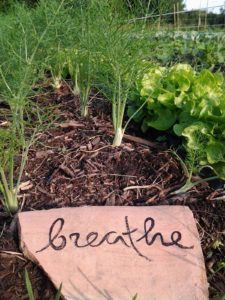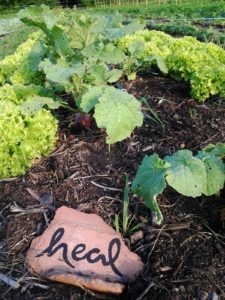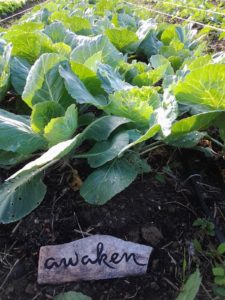Methods
Agroecology
Our method of growing organic food is based on classical organic farming methods and some permaculture elements. The Happy Farm Method is an intensive method of growing a lot of vegetables on a small scale. But most importantly we share that pur model is one of agroecology. This is where the production of food has no more importance than caring for and enhancing the ecology of the land onto which we intervened. As farmers in the human family we declare that we will care for all of more than human family that we share this land with.
Our main aims in farming are to nourish the soil and to grow food organically. We do this by:
- Using natural soil amendments.
- Crop rotation
- Using green manure or cover crops
- Cultivating the soil in ways that preserves the delicate soil ecosystem, such as no-dig methods
- Mulching
- Companion planting
We grow food that meet the needs of each hamlet. This means a variety of vegetables that are regularly used. We cultivate them especially for the spring and the summer retreat. The summer retreat in July is attended by more than 1000 people per week.



Mindfulness Practice
Entering the Garden
I see my true self
in it's reflection
my heart is at peace.
At the Happy Farm we grow organic vegetables and bring the mindfulness practice and farming together. It is a training ground in applying the prinicples of mindfulness into a working environment. Together we do our best to apply the principles of mindfulness and working meditation on the farm. This includes, amongst other things, working in a silence for a certain period during the day, using the breath to anchor ourselves in the present moment, stopping to listen to the bell at times throughout the day and having regular team sharings. We like to establish a good way in that we can be in the practice as well as get the farm work done.
Here are some of the practices we use on the farm.
Morning Circle and Check-In
We start each work day with a short sitting meditation. Following, we have a check-in round for each of us to share how we are at the moment. It's a natural way to get in contact with each other before we start to work together. We can share our joys and offer support to anyone going through something difficult.
Silence
In the mornings we work in silence. We like to create a work environment where we can be in contact with our breath and senses as well as the natural world around us.
Stopping and the Sound of the Bell
In order to deepen the healing silence, we like to practise stopping—that is, stopping the internal noise of our habitual needless thinking. We enjoy using the sound of a bell as an opportunity to remind ourselves of this. Several times during the day we invite the bell at the farm so that we can stop, bring our mind and body together to this simple enjoyment of our in-breath and out-breath and to get in touch with the nature surrounding us.
Singing
We sing a Plum Village song [link] in the morning or before the walking meditation.
Walking Meditation
In the morning we have a break together where we either do a walking meditation or enjoy a tea break.
Sharings
We have regular sharings in the group as well with our monastic mentor. This way we stay in touch what is going on with each other and in the group.
Siblinghood
The morning circle, the work at the farm, the practice and living together supports us a lot to build a strong connection. We share responsibilities (rotations on watering, hosting guests), learn from each other and share joyful moments outside of work.
The Lower and Upper Hamlet Happy Farm have established a warm sibling connection. We help each other and benefit from the knowledge. Every second week we meet for a work exchange on one of the farms. It helps to strengthen the connection and supports each other a lot with the work.
